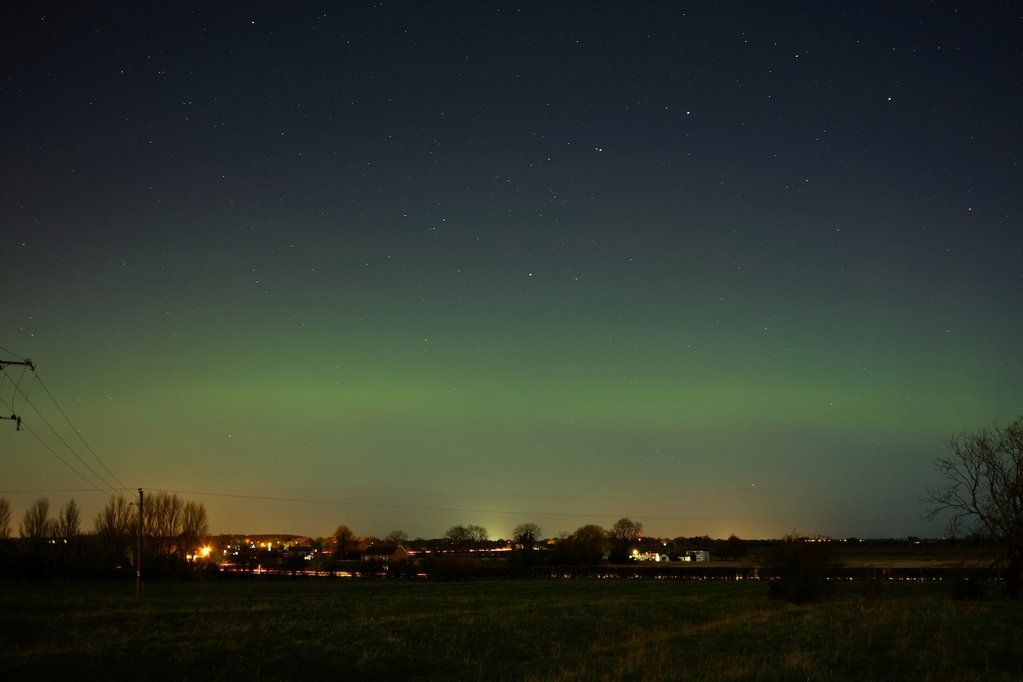Aurora in Lincolnshire
On Sunday night, I saw the aurora borealis – from Lincolnshire. But part of me is disappointed that I didn’t see it in what I imagine to be its proper setting.
Back when I lived in Scotland, I’d heard rumours of the aurora for years. It was described as an incredibly rare and special phenomenon in the UK, witnessed only by the very lucky or the very dedicated – those who were willing to bivouac on the summit of Ben Hope on a clear night in the middle of winter, for example, and hope the stars were in alignment.
To see the Northern Lights from the wilderness has been one of my greatest wishes for many years. I have always associated the aurora with wilderness, winter, and that ephemeral quality of ‘northness’ that you can taste in certain special places: in the forest of Rothiemurchus while all is silent and blanketed in deep snow, or questing through the Assynt wilderness, or standing on the rock of Cape Wrath looking out into the Atlantic. But I had not seen the aurora in any of those places.
The rational part of my brain knows that the aurora is just a reaction between charged solar particles and the atmosphere of this planet. It’s a manifestation of the physical laws of our universe, and although the probability of it being visible from anywhere in Britain is never great, there is always a chance of an observer being in the right place at the right time. I know this, and yet.
The more primitive part of me, the part that yearns for wilderness and drives me back into the hills again and again, sees the aurora as more than that – as a harbinger that cries in an unearthly voice, this place is wild, this place is north.
Imagine my surprise when, on Sunday night, I saw a geomagnetic storm alert on Twitter and reports of aurora being visible from as far south as Oxfordshire. I decided to take a chance and went out into the meadow with my camera and tripod.
The temperature was 11C as I stood there in a cultivated field. The road was fifty yards away; houses were even closer. A line of telephone pylons tracked overhead just behind me, and on every point of the compass blooms of light pollution stained an otherwise clear sky. Lincolnshire is very rural, but the threads of urban sprawl have worked their way through the fabric of the land, destroying all but the most subtle traces of wilderness. And Lincolnshire is so very far south. In short, it was the last place imaginable that I expected to see the Northern Lights.
But, as my eyes adjusted, I saw them.
At first I thought it was just the glare of towns to the north, but gradually I discerned a green hint to the lights just above the horizon. There was a phosphorescent glow stretching across the sky – like a halo of cloud lit from within, but so very faint.
I set up my camera and captured a twenty-second exposure at ISO 640. And my camera recorded the aurora more clearly than my eyes could hope to.

I looked at the image on my camera’s display, which blinded me, and then squinted back at the sky. The afterglow faded; the aurora returned. It was undeniably there – the persistent, gentle, but otherworldly glow of the Northern Lights. I watched it flicker and hum until it faded.
Part of me is humbled and awed to have witnessed the aurora at last, and I’m pleased with the photograph I captured – a photograph which has since been shared far and wide over the Web. But that other part of me, the part that knows how to listen to the forest and the wind in the hills, feels that perhaps the harbinger I have long dreamt of has slipped a little further from my grasp – that the aurora has flaunted itself too readily, that somehow I should not have seen it where and when I did.
Perhaps I’m writing nonsense. I’m glad to have seen it, especially in such unusual circumstances. But I know I’ll appreciate it more when I look up from some frozen northern summit, deep in the wild, and see the skies lit up once again.
Alex Roddie Newsletter
Join the newsletter to receive the latest updates in your inbox.



